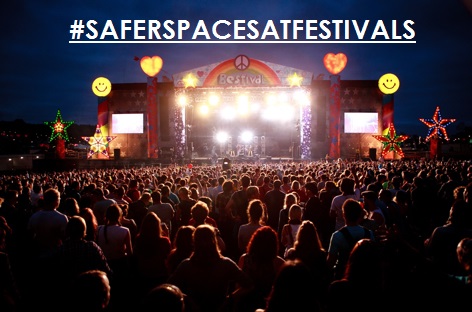If you’re on a festival website on Monday 8th May and are simply shown a blank screen with the hashtag, ‘#saferspacesatfestivals’, then do not be alarmed. This is not a technical issue, but the latest campaign in an attempt to crack down on the issue of sexual assault at music events. Various popular British music festivals, including Bestival, Secret Garden Party and Parklife, will be taking part in this online blackout as a part of the Safer Spaces campaign. Launched by the Association of Independent Festivals, the movement aims to raise awareness and demonstrate a strong no-tolerance policy towards sexual harassment at festivals.
The concept has been welcomed by many music fans along with associations such as Safe Gigs for Women. All too often, incidents of sexual harassment in these situations is not taken seriously enough and blamed on overcrowded spaces and drug and alcohol abuse. However, festivals are beginning to take a stand against this and raise awareness for what is becoming a prevailing issue at their events. Many were outraged after two women were raped at Reading Festival last year, and unfortunately this is just the tip of an iceberg of accusations that have plagued the summer festival scene for years. Fortunately, an increase in zero-tolerance campaigns along-side access to support systems for victims, is certainly a move in the right direction.
However, in other recent news, allegations have been made against Lee Broadbent, lead singer of rock band, Cabbage. Nicole Rushworth claims to have witnessed the singer “put his hands down his trousers, fondle himself, then rub his hand over the girl, ragging on her hair” before “forcing her face first into his crotch”. The band have denied the allegations claiming that “[Broadbent’s] hands were never down his trousers although he did go down to the barrier to interact with the crowd, as he does at all Cabbage shows” and referring to the claims as “fabrications”. The incident allegedly occurred at the O2 Forum in Kentish Town, where the band were supporting Kasabian.
A few words on the behaviour of @ahcabbage last night at @KasabianHQ, please suppprt @safegigs4women to encourage a safer gig environment pic.twitter.com/xXujlsS8EC
— Nicole S. Rushworth (@NicoleSR1) April 20, 2017
Despite the issue of sexual assault at gigs gaining more recognition recently, these accusations, whether true or not, show just how prevalent this problem really is. The press coverage of the Cabbage incident was pretty brief and if you don’t follow music news, you probably missed it. It seems to have all but disappeared now, which is disappointing because the questions that it raised deserve more attention. Especially since many incidents are committed by crowd members themselves and all too often go unreported and therefore do not result in punishment of any kind.
Much like the efforts of festival organisers, many artists are also beginning to address this problem by supporting organisations such as Safe Gigs for Women. The initiative has gathered support from many well-known bands and artists, including Frank Turner, who wrote a blog on his feelings towards this issue (well worth a read). SGFW have made great strides but stress that they alone cannot solve this problem. The initiative requires support from artists, venues and music fans in order to effectively protect gig-goers.
Unfortunately, recent events indicate that we still have a long way to go. Despite the positive efforts being made by artists and venues, there is only so much that they can do to control what happens at concerts. The crowds themselves must also bare responsibility. It should be a pretty basic requirement that everyone should be able to go to see the bands they love without the fear of sexual harassment. However, it’s likely that we are all collectively guilty of turning a blind eye to this problem and blaming otherwise unacceptable behaviour on beer and ‘laddishness’.
We all need to do our bit towards creating a safe environment where everyone can relax and enjoy the music that we love. This means supporting the efforts of initiatives such as Safer Spaces and Safe Gigs for Women as well as being vigilant at the gigs that we ourselves attend. It is a saddening fact that in 2017, going to see your favourite band could be a potentially dangerous experience. But hopefully, what these movements foreshadow is a crack-down on sexual assault and the creation of music venues in which everyone can enjoy themselves.
Katie O’Kelly
Image: Resident Advisor and Juliette Rowsell

